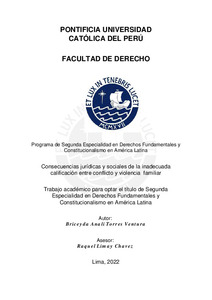| dc.contributor.advisor | Limay Chávez, Raquel | |
| dc.contributor.author | Torres Ventura, Briceyda Anali | |
| dc.date.accessioned | 2023-05-09T15:02:11Z | |
| dc.date.available | 2023-05-09T15:02:11Z | |
| dc.date.created | 2022 | |
| dc.date.issued | 2023-05-09 | |
| dc.identifier.uri | http://hdl.handle.net/20.500.12404/24922 | |
| dc.description.abstract | El presente artículo, tiene como objetivo determinar las consecuencias jurídicas
y sociales de la inadecuada calificación entre violencia familiar y conflicto familiar;
es así que, contribuirá con generar conceptos que identifiquen determinadas
posiciones para la adecuada aplicación salvaguardando el desarrollo de la
sociedad y de la familia.
En el Perú, no se encuentra definido el concepto de conflicto familiar, sin
embargo, existen leyes que hacen referencia de manera teórica al concepto de
violencia, como por ejemplo la Ley N° 30364, en donde define el término
violencia e identifica y diferencia entre violencia contra las mujeres y violencia
contra los integrantes del grupo familiar.
En esa misma línea, contamos con diverso marco jurídico internacional que nos
brinda soporte legal respecto al concepto de violencia contra la mujer e
integrantes del grupo familiar, como el Pacto Internacional de Derechos Civiles
y Políticos y Pacto Internacional de Derechos Económicos, Sociales y Culturales;
Declaración de Naciones Unidas sobre eliminación de violencia sobre la mujer;
Convención sobre la eliminación de violencia sobre la mujer; Convención sobre
la eliminación de todas las formas de discriminación contra la mujer CEDAW,
Convención sobre los Derechos del Niño; Convención internacional sobre toda
discriminación racial, Convención Interamericana para prevenir, sancionar y
erradicar la violencia contra la mujer – “Convención de Belém Do Pará”, entre
otros.
Como bien hemos señalado, no se cuenta con una base jurídica que delimite
dichos términos, lo cuales son aplicados sin considerar sus diferencias por lo
que, mediante el presente estableceremos las consecuencias jurídicas y sociales
que genera no establecer unmarco normativo específico, doctrinario que permite
el análisis de hechos que se presentan en nuestra sociedad. | es_ES |
| dc.description.abstract | This article aims to determine the legal and social consequences of the
inadequate interpretation between family violence and family conflict; Thus, it will
contribute to generate concepts that identify certain positions for the proper
application, safeguarding the development of society and thefamily.
In Peru, the concept of family conflict is not defined, however, there are laws that
theoretically refer to the concept of violence, such as Law No. 30364, where it
defines the term violence and identifies and differentiates between violence
against women and violence against members of the family group.
Along the same lines, we have a diverse international legal framework that
provides us with legal support regarding the concept of violence against women
and members of the family group, such as the International Covenant on Civil
and Political Rights and the International Covenant on Economic, Social and
Cultural Rights; United Nations Declaration on the elimination of violence against
women; Convention on the elimination of violence against women; Convention
on the elimination of all forms of discrimination against women CEDAW,
Convention on the Rights of the Child; International Convention on all racial
discrimination, Inter-American Convention to prevent, punish and eradicate
violence against women - "Convention of Belém Do Pará", among others.
As we have pointed out, there is no legal basis that delimits these terms, which
are applied without considering their differences, so that, through this document,
we will establish the legal and social consequences generated by not establishing
a specific normative framework, doctrinaire that allows the analysis of facts that
occur in our society. | es_ES |
| dc.description.uri | Trabajo académico | |
| dc.language.iso | spa | es_ES |
| dc.publisher | Pontificia Universidad Católica del Perú | |
| dc.rights | info:eu-repo/semantics/openAccess | es_ES |
| dc.rights.uri | http://creativecommons.org/licenses/by-sa/2.5/pe/ | * |
| dc.subject | Violencia familiar | es_ES |
| dc.subject | Violencia familiar--Legislación--Perú | es_ES |
| dc.subject | Derecho y sociedad | es_ES |
| dc.title | Consecuencias jurídicas y sociales de la inadecuada calificación entre conflicto y violencia familiar | es_ES |
| dc.type | info:eu-repo/semantics/bachelorThesis | es_ES |
| thesis.degree.name | Segunda Especialidad en Derechos Fundamentales y Constitucionalismo en América Latina | es_ES |
| thesis.degree.level | Título Profesional | es_ES |
| thesis.degree.grantor | Pontificia Universidad Católica del Perú. Facultad de Derecho | es_ES |
| thesis.degree.discipline | Derechos Fundamentales y Constitucionalismo en América Latina | es_ES |
| renati.advisor.dni | 46661906 | |
| renati.advisor.orcid | https://orcid.org/0000-0001-9278-1067 | es_ES |
| renati.author.dni | 72114224 | |
| renati.discipline | 421189 | es_ES |
| renati.level | https://purl.org/pe-repo/renati/level#tituloSegundaEspecialidad | es_ES |
| renati.type | https://purl.org/pe-repo/renati/type#trabajoAcademico | es_ES |
| dc.publisher.country | PE | es_ES |
| dc.subject.ocde | https://purl.org/pe-repo/ocde/ford#5.05.01 | es_ES |







